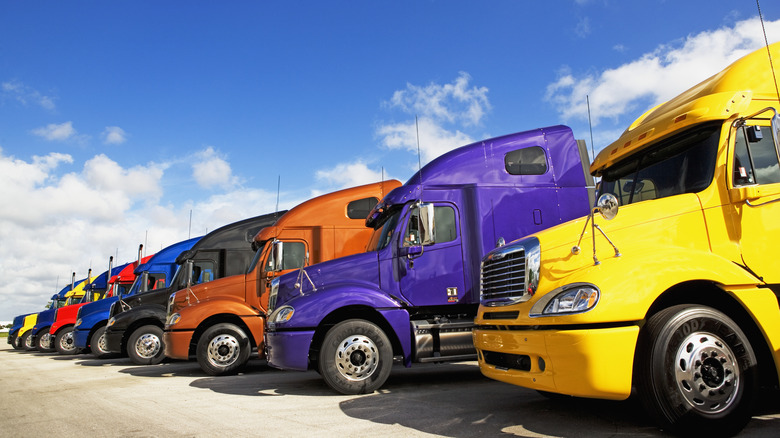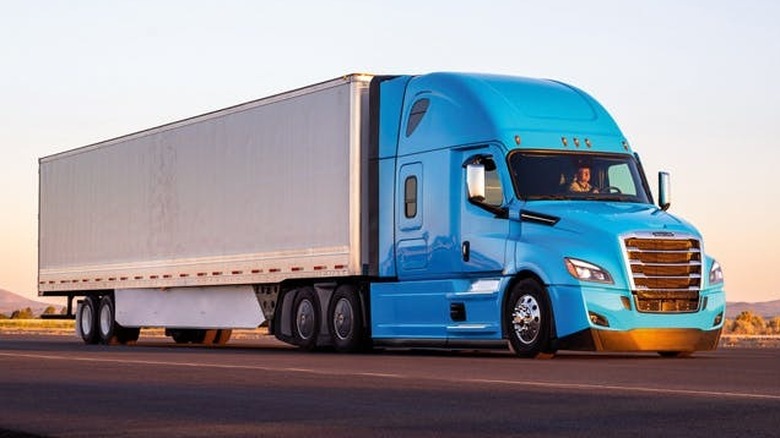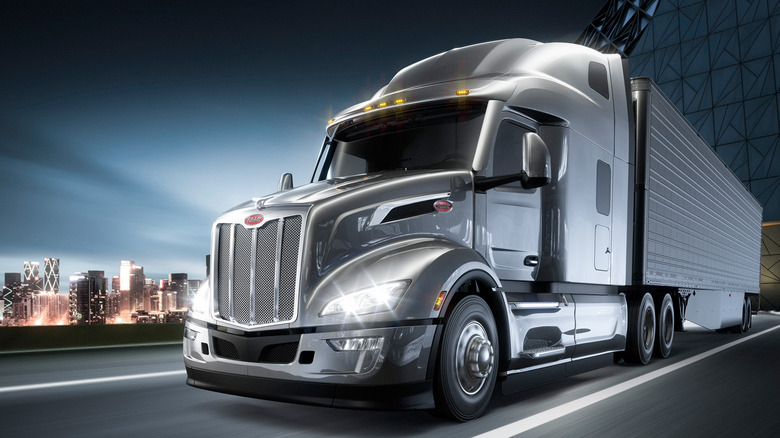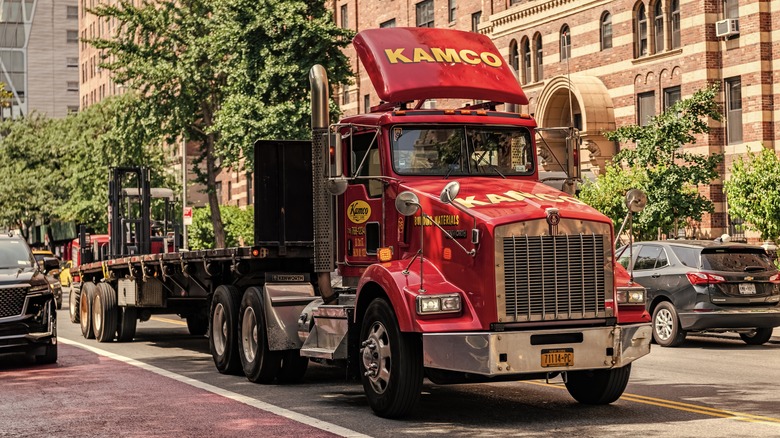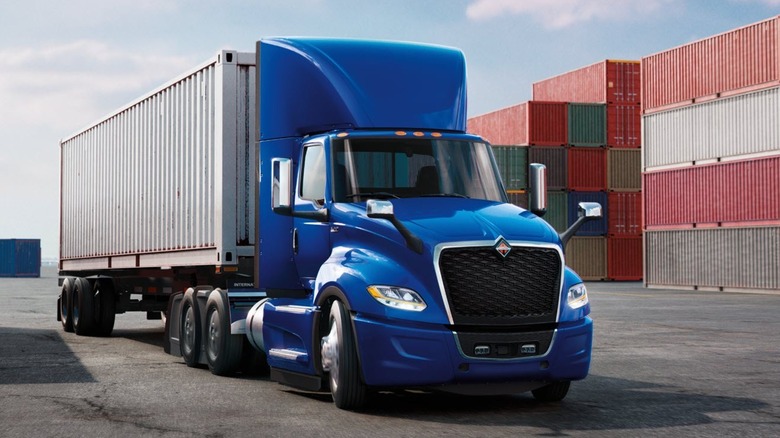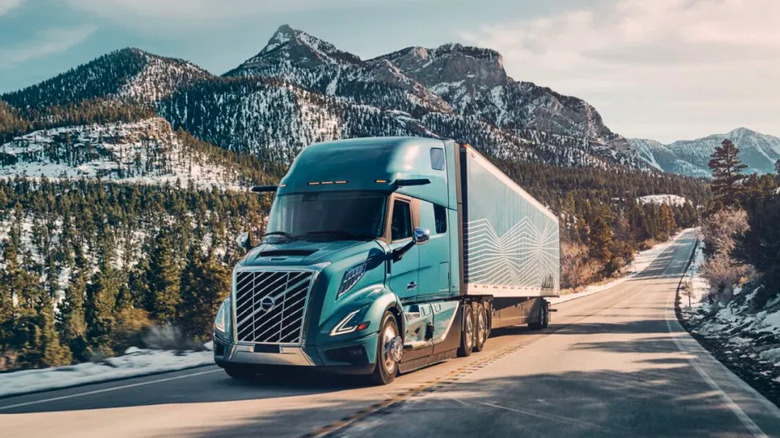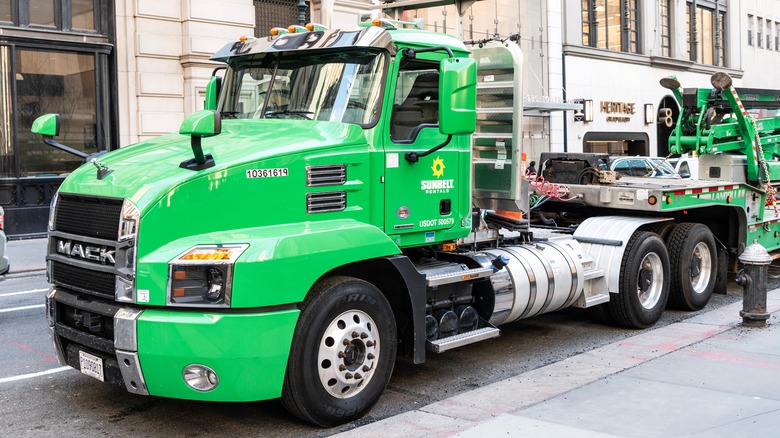6 Of The Most Popular Semi-Truck Brands In America
It's almost impossible to overstate just how important the trucking industry is to the U.S., with semi-trucks carrying over 11 billion tons of freight (in primary shipments) over American roads in 2023 alone. With so many big rigs driving across the country, there is clearly a lot of money to be made in manufacturing and selling semi-trucks. In 2023 the semi market was valued at $141.7 billion, and it's expected to grow over the next decade.
Freight companies and independent truckers often look for certain qualities in a heavy-duty tractor that will save them money in the long run. That includes fuel efficiency, initial costs, durability, and reliability — after all, you're not going to make much money shipping cargo if your truck is constantly breaking down on the side of the highway. Driver comfort can also be important, since truckers spend a lot of time in a semi's cab and should to be at their best in order to reach their destination on time. Similarly, there is an increasing appetite for newer technology and innovative features, like driver assistance systems and modern displays.
Another factor that's growing in importance is sustainability. Just because the auto industry is making a big push into all-electric motors doesn't mean semis — which are primarily fueled by diesel — will soon be a thing of the past. Several of the biggest names in trucking have already begun converting popular models into BEV models or designing new ones from scratch. If you're wondering what the biggest names in trucking are and whether you've heard of them before, here are the six most popular semi-truck brands in America, which collectively account for nearly all of the big rigs currently transporting goods around the country.
Freightliner
Freightliner isn't just one of the most popular semi-truck brands in America — it's without a doubt the most popular, and by a wide margin, at least if you're going strictly by sales. As of 2024, Freightliner commands nearly 38% of semi-truck sales in the U.S. As a result, Freightliner has a variety of different types of trucks on the road, including the Cascadia, which has a sleek, aerodynamic design that helps make it more fuel efficient — even with a whopping max 600 horsepower. Truckers are big fans of the brand, as Freightliner doesn't ignore driver comfort, which is obviously important for workers spending countless hours behind the wheel.
The brand has built a reputation for being reliable and durable, as well as developing and incorporating advanced technology, which has become just as — if not more — important to the trucking industry as it has for commercial automakers. The company has even launched fully-electric commercial trucks including the eCascadia, which has a range of up to 230 miles and can recharge up to 80% in under 90 minutes, as well as the medium-duty eM2, which can do the same in under an hour and has a range of up to 250 miles. Freightliner even built a prototype autonomous big rig way back in 2015.
Peterbilt
Nearly 15% of semi-trucks sold in America are Peterbilt trucks. Peterbilt Motors Company is a subsidiary of PACCAR, which also owns popular big rig brand Kenworth and manufactures many of the engines that power Peterbilt vehicles. Peterbilt is popular partly for its willingness to customize vehicles to best fit its clients' needs and preferences. The distinct designs of these trucks often include sleek lines, long hoods, and striking front grilles that are hard to ignore.
In addition to long-haul tractors, the brand also makes regional and vocational trucks, among other vehicle types. The Peterbilt 579 is one of its best-known rigs and boasts up to 605 horsepower, while also being fuel efficient and including roomy, comfortable sleeper cabs for its drivers.
As one of the leading semi-truck brands in the U.S., Peterbilt has also made a commitment to a greener future. The battery-electric model of its 579EV is even slightly more powerful, with a 500 kW engine that can deliver up to 670 horsepower. It can run 150 miles on a single charge and is particularly efficient for regional hauls, as its regenerative braking system conserves energy during the frequent stopping and starting that off-highway travel often involves.
Kenworth
PACCAR also owns Kenworth Trucks. By itself, Kenworth boasts 14% of the semi-truck sales, which means that PACCAR has hold of around 29% of the entire market share in the country, second only to Freightliner. Like its sibling company, Kenworth also provides customizable medium and heavy-duty trucks, and its vehicles are also known for their durability, efficiency, and versatility. It's also known for using quality materials, ergonomic seating, and easier-to-use controls. Truckers also find Kenworth's advanced technology valuable, such as adaptive cruise control, collision avoidance features, and modern infotainment options.
The T680 is perhaps the best-known long-hauler made by Kenworth. It sports an innovative aerodynamic design — including a narrower hood and grille design — that the company claims saves owners up to seven percent in fuel savings. The truck's PACCAR engine can also deliver up to 510 horsepower and 1,850 lb-ft of torque. Kenworth also offers alternative fuel options including both natural gas and hybrid engines, as well as EVs, including a fully-electric model of its T680.
While T680 DCEV doesn't pack quite as much horsepower as its diesel counterpart, it can travel up to 450 miles on a single charge and reach speeds of up to 70 miles per hour. As highways become more and more populated by electric cars and trucks, Kenworth will likely remain a popular semi-truck brand in America if it continues to innovate and incorporate EVs into its fleet.
International
With an 11% share of the American semi-truck market, International Trucks is one of the most popular brands in the country. International, which also makes cement mixers and other heavy-duty vehicles, is owned by Navistar, which also manufactures truck parts and operates IC Bus, a major brand in its own right that builds school buses. Notably, International uses its own first-party axles in its trucks, as opposed to the Eaton Fuller or Rockwell axles used by many other popular semi brands in their drivetrains.
The brand makes a versatile fleet of trucks, including light, medium, and heavy-duty rigs, as well as severe-duty dump trucks. One option for truckers and trucking companies is an LT Series rig with a Cummins X15 Efficiency Engine (which is comparable to PACCAR's diesel engines), a tractor that's propelled by up to 565 horsepower with 2,050 lb-ft of torque.
The LT Series also provides several cab options for drivers, including day cabs and low-roof, high-rise, and sky-rise sleepers. International has also leaned into making more zero-emission vehicles and says that its EVs have already logged millions of miles of real-world road. The medium-duty eMV made by International, for example, has an average range of 135 miles and can produce up to 342 horsepower.
Volvo
Even if you don't know much about 18-wheelers, one semi-truck brand you've likely heard of is Volvo — the same Swedish company that makes passenger cars and SUVs. In addition to these vehicles, Volvo also accounts for over 10% of big rigs in the U.S. Along with other factors that are popular with truckers and shipping companies – including fuel efficiency, reliability, driver comfort, and durability — newer Volvo trucks are equipped with state-of-the-art smart technology that can monitor performance in real-time and allow for enhanced fleet management. Advanced safety features and driver assistance systems also make Volvo trucks easier and safer to drive.
Plus, Volvo trucks have solid maneuverability, which makes them ideal for regional and local distribution in urban environments with smaller, more congested streets. One standout model from the brand is the Volvo VNL, which features state-of-the-art amenities like a digital information display and infotainment system in the dash, stalk-mounting shifting, and a comfortable, modern-looking sleeping space. The VNL is also fuel efficient, has a peak torque of 1,950 lb-ft, and can deliver up to 500 horsepower.
As with other major semi manufacturers, Volvo also now has fully-electric models available, including the Volvo FH and the Volvo VNR Electric, which has a 275-mile range and can charge up to 80% in 90 minutes.
Mack
Perhaps the most well-known name in trucking is Mack, which was founded in Brooklyn, New York at the turn of the last century – nearly a decade before the Model-T first hit the road. While it was once an independent company, Mack has been owned by Volvo since 2001, though still operates at its own separate brand from its parent company. Mack makes up around 8.4% of the semi-trucks in the U.S. Combined with the rest of its 10% market share, that makes Volvo responsible for over 18% of the big rigs in America.
Mack trucks have a reputation for prioritizing durability over driver comfort, so while truckers might not love the cab of a Mack, they'll appreciate its ability to make long hauls in tough conditions. The Mack Anthem is a Class 8 tractor with up to 505 horsepower under its hood and which sports a comfier cab than previous Macks, with a ceiling height of over seven feet in the sleeper and modular cabins that allow for customizable storage spaces, flatscreen TVs, microwaves, and stainless steel refrigerators.
While the brand has released smaller EV trucks, there is still no fully-electric Mack big rig for long hauls. Considering that Volvo is already catering to that part of the market, it's currently unclear if Mack will eventually transition to an electric future or cede more ground to other major semi-truck brands and become less of an American trucking staple and more of a niche — albeit one with a legacy well over 100 years old.
